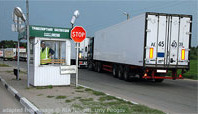RIA Novosti: EU-Russia Sanctions: No One Wants to Show They are Giving in First

MOSCOW, October 29 (RIA Novosti) – The anti-Russian sanctions imposed by the European Union will not be scaled back or rescinded in the immediate future.
They’re likely to be in effect until mid-March of next year, an EU diplomatic source told RIA Novosti.
But as Nigel Kushner, the CEO of W Legal, an international law firm that specializes in sanctions, explained to Radio VR, the EU simply does not know what to do next.
On the one hand, he said, the EU is sitting tight at the moment, desperately hoping that the situation does not deteriorate, and frightened of retaliations from Russia. On the other, they don’t want to show that they are giving in first.
“For many EU viewpoints the ball is in Russia’s court,” he said. “And, I think the EU is frightened about what Russia’s reaction might be. If we compare that to the sanctions against Iran, it is quite different. Iran could not fight back. Iran was punished, and the Iranian economy was decimated for a number of years. But Russia can fight back. Yes, Russian economy can be impacted but certainly not in the same way as the Iranian one.”
“Recently there was great fear in the EU that Russia might ban car imports from the EU,” Kushner added. “Sometimes the unknown factors in the sanctions regime cause a more significant effect that the known ones.”
“I don’t think sanctions will work against Russia, but the EU is stuck: it is pretty clear that any military retaliation by the EU simply will not happen. But at the same time, the EU cannot sit back and do nothing,” he said.
Kushner added that the sanctions could be lifted overnight – it is a very easy process. However, the difficulty is that the EU needs to unanimously agree on it, and that is where there are problems. There would be holdouts within the EU; for example, the Czech Republic which has said recently that “if Russia shows good will”, then the Czech Republic might push within the EU for an easing of sanctions. But you have two problems here, he added: what does “good will” mean? It will mean different things to different EU member states: is it a deal when gas supplies are delivered to Ukraine or when the Ukraine repays its debts to Russia? Or is it tied more closely to the behavior of Russia in Crimea?
The second problem is, Kushner added, that even if you have “good will”, how powerful is the Czech Republic within the EU? How can they dictate and ensure that there is unanimous agreement?
“One thing that I’ve seen over the previous months – is great disagreement amongst the EU leadership: there is the perception in the EU that the pain has not been shared equally,” he said. “For example, Poland has really been suffering from Russian sanctions on exports of fruits and vegetables, and dairy products and meat, but what about the others? So, there is a perception among some countries that the UK, for example, hasn’t really been impacted significantly. The French were upset that they were being forced to give up the sale of warships. So, everyone thinks that the EU is one happy family, but really it is not.”
Robert Oulds, Director of the Bruges Group, an independent British-based think tank, is convinced that if Russia easies its sanctions in the EU, it will simply be seen in the corridors of Washington and Brussels as a sign of weakness.
“If Russia makes a concession, then more pressure will be put upon Russia to make further concessions until the US reaches it geopolitical aim of getting Ukraine into NATO and the EU,” he told Radio VR. “My advice is quite simple: do not make concessions. This conflict was started in the West, when it played political games in Ukraine and overthrew its democratically-elected President. It has been encouraged by the West, which has turned the blind eye to the criminal actions of the Ukrainian military forces, which are targeting civilians. If any concessions are made then more concessions will be demanded.”
Oulds added that the US should mind its own business and pressure should be put on the Ukrainian president and his government to establish a peaceful resolution of the conflict in his country and stop being so nationalistic. This may be easier said than done in a country where nationalism and Russophobia are becoming more and more synonymous, and where accepting Crimea’s decision to join Russia could constitute political suicide.

